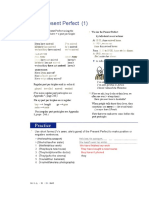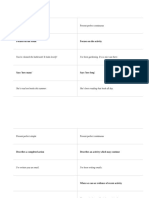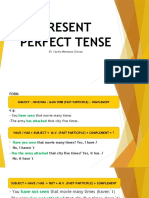Present Perfect
Present Perfect
Uploaded by
clarasemitielbCopyright:
Available Formats
Present Perfect
Present Perfect
Uploaded by
clarasemitielbCopyright
Available Formats
Share this document
Did you find this document useful?
Is this content inappropriate?
Copyright:
Available Formats
Present Perfect
Present Perfect
Uploaded by
clarasemitielbCopyright:
Available Formats
PRESENT PERFECT
The present perfect is formed from the present tense of the verb have and the past participle of
a verb:
SUBJECT + HAVE + PAST PARTICIPLE + COMPLEMENT
for something that started in the past and continues in the present:
They've been married for nearly fifty years. She has lived in Liverpool all her life.
when we are talking about our experience up to the present:
I've seen that film before.
I've played the guitar ever since I was a teenager.
He has written three books and he is working on another one.
We often use the adverb EVER to talk about experience up to the present:
My last birthday was the worst day I have ever had.
and we use NEVER for the negative form:
Have you ever met George?
Yes, but I've never met his wife.
REMEMBER that the adverbs 'ever' and 'never' go AFTER 'have/has' and BEFORE the
past participle.
for something that happened in the past but is important in the present:
I can't get in the house. I've lost my keys.
Teresa isn't at home. I think she has gone shopping.
HAVE BEEN AND HAVE GONE
We use have/has been when someone has gone to a place and returned:
A: Where have you been?
B: I've just been out to the supermarket.
A: Have you ever been to San Francisco?
B: No, but I've been to Los Angeles.
But when someone has not returned, we use have/has gone:
A: Where's Maria? I haven't seen her for weeks.
B: She's gone to Paris for a week. She'll be back tomorrow.
PRESENT PERFECT WITH TIME ADVERBS
Adverbials which refer to the recent past: RECENTLY, JUST
Scientists have recently discovered a new breed of monkey.
We have just got back from our holidays.
or adverbs which include the present:
so far until now up to now // ever (in questions) // yet (in questions and negatives)
Have you ever seen a ghost?
Where have you been up to now?
A: Have you finished your homework yet?
B: No, so far I've only done my history.
After a clause with the present perfect we often use a clause with since to show when
something started in the past:
I've worked here since I left school.
I've been watching that programme every week since it started.
Exercises.
1. Sophie and I (know) _____________________ each other since we were at school together.
2. I (play) _____________________ tennis since I was eight years old.
3. Alain (be) _____________________ in hospital three times this year.
4. I (want) _____________________ to be an actor for as long as I can remember.
5. My uncle (smoke) _____________________ 40 cigarettes a day for 40 years – and he's a
doctor!
6. You (have) _____________________ that suit for more than ten years! Isn't it time to get a
new one?
7. Since he finished university, my brother (work) _____________________ in five different
countries.
8. Zerrin (watch) _____________________ that TV programme every week since it started.
9. I (never like) _____________________ bananas. I think they're horrible!
10. What's the most interesting city you (ever visit) _____________________ ?
2. Complete with been or gone.
Your hair looks nice. Have you ___________ to the hairdresser's?
Keith has ___________ to the shop to get some bread. He'll be back in five minutes.
I've ___________ to the shop but there was no bread. Sorry!
Reginald has ___________ to Istanbul on business five or six times this year.
Ms Evans isn't in her office. She's probably ___________ home.
Where has my passport ___________? I can't find it anywhere.
3. Write these questions in present perfect.
1.-Who/buy the newspaper ?
___________________________________________________________________ ?
2.-he/meet your family yet ?
___________________________________________________________________ ?
3.-My parents/not eat dinner yet.
___________________________________________________________________.
4.-she/drink her glass of water ?
___________________________________________________________________ ?
5.-you/ever miss the bus ?
___________________________________________________________________ ?
6.-She/decide where to go on holidays.
___________________________________________________________________.
7.-Why he/not finish his homework.
___________________________________________________________________ ?
8.-Where/you park the car ?
___________________________________________________________________ ?
9.-The man/ shut the door.
___________________________________________________________________ .
10.-Why/ the police arrest that boy ?
___________________________________________________________________ ?
You might also like
- How To Write ColumnsDocument17 pagesHow To Write Columnsilecra raspa ogeinam100% (3)
- Activating Grammar Key PDFDocument62 pagesActivating Grammar Key PDFelisabri87No ratings yet
- Present Perfect TenseDocument42 pagesPresent Perfect TenseJC_RC_777100% (6)
- Oriental Influences in Swahili - LodhiDocument136 pagesOriental Influences in Swahili - LodhiNati ManNo ratings yet
- ExerciseDocument12 pagesExerciseHo Man TikNo ratings yet
- Three Tenses - Extra ExercisesDocument19 pagesThree Tenses - Extra ExercisesNishantha ChandrasekaraNo ratings yet
- Macroeconomia - MankiwDocument6 pagesMacroeconomia - MankiwDaniela Ramos EduardoNo ratings yet
- 11TH Meeting - Present PerfectDocument24 pages11TH Meeting - Present PerfectIndah SariNo ratings yet
- Present PerfectDocument2 pagesPresent PerfectCarmen DulgheruNo ratings yet
- Present Perfect 1Document6 pagesPresent Perfect 1Ana María CarriónNo ratings yet
- Present Continuous TenseDocument5 pagesPresent Continuous TenseBibie MaureenaNo ratings yet
- Present Simple Vs Present PerfectDocument7 pagesPresent Simple Vs Present PerfectMariaSt100% (1)
- Irregular Verbs: Past Participle For Present Perfect Tense: Mmar/verbs - Easy PDFDocument9 pagesIrregular Verbs: Past Participle For Present Perfect Tense: Mmar/verbs - Easy PDFLiliana CarvajalNo ratings yet
- Simple Past TenseDocument3 pagesSimple Past TenseClara UbaltonNo ratings yet
- Ing Form of The VerbDocument2 pagesIng Form of The Verbjames-hallak100% (1)
- English IV Guide 2 Past Simple and Present Perfect TenseDocument12 pagesEnglish IV Guide 2 Past Simple and Present Perfect TenseNeydu LealNo ratings yet
- InglêsDocument7 pagesInglêsmoura2007No ratings yet
- Present Perfect TenseDocument23 pagesPresent Perfect TenseAnthony CoaguilaNo ratings yet
- Unit 3. The Present PerfectDocument8 pagesUnit 3. The Present Perfectgiangly2005spNo ratings yet
- PRESENT Tenses UsageDocument4 pagesPRESENT Tenses UsageSkruzdelyte MielaNo ratings yet
- Present PerfectDocument27 pagesPresent PerfectAylen RossyNo ratings yet
- Present PerfectDocument5 pagesPresent PerfectEnglishlifeNo ratings yet
- Present TenseDocument21 pagesPresent TenseJuna GaribashviliNo ratings yet
- Present PerfectDocument9 pagesPresent Perfectsherry0% (1)
- Inglés 6 Cuadernillo AlumnoDocument50 pagesInglés 6 Cuadernillo AlumnoolaffloresNo ratings yet
- Present PerfectDocument14 pagesPresent Perfectmajsal224No ratings yet
- English Grammatik Mit Present PerfectDocument3 pagesEnglish Grammatik Mit Present Perfectmalaika lahyaniNo ratings yet
- Unit One: WH Questions ReviewDocument17 pagesUnit One: WH Questions ReviewMohammedYoussefNo ratings yet
- PresentContinuous PastContinuous PastSimple PresentSimpleDocument9 pagesPresentContinuous PastContinuous PastSimple PresentSimpleSofia RibeiroNo ratings yet
- Present Perfect + ContDocument4 pagesPresent Perfect + ContYulia ChukarevaNo ratings yet
- Definition of The Present Perfect TenseDocument20 pagesDefinition of The Present Perfect TenseSelebriti Rafiq ChikidotNo ratings yet
- TALLERnPRESENTnPERFECTnREALIZADOn1 5760ca88564effaDocument6 pagesTALLERnPRESENTnPERFECTnREALIZADOn1 5760ca88564effaYULY BUITRAGONo ratings yet
- Pdfcoffee.com English Grammar British Council PDF FreeDocument139 pagesPdfcoffee.com English Grammar British Council PDF FreensjeyachandranNo ratings yet
- Present Perfect or Present Perfect ContinuousDocument3 pagesPresent Perfect or Present Perfect Continuousyoureslteacher100% (2)
- Book 3 Teacher-MergedDocument87 pagesBook 3 Teacher-MergedAndrea PalomboNo ratings yet
- Present Perfect and PresentPerfectContinuosRossyDocument20 pagesPresent Perfect and PresentPerfectContinuosRossyRosa mar ReyesNo ratings yet
- Present Perfect - 2024Document5 pagesPresent Perfect - 2024Tran HieuNo ratings yet
- Introduction To Verb Tenses: The PresentDocument18 pagesIntroduction To Verb Tenses: The PresentLuci100% (1)
- Past Simple Vs Present PerfectDocument4 pagesPast Simple Vs Present PerfectLolaMilickovicNo ratings yet
- Present Simple Vs Present ContinuousDocument22 pagesPresent Simple Vs Present ContinuousZaga VuckovicNo ratings yet
- Present perfect s+cDocument17 pagesPresent perfect s+cIoana AlexandraNo ratings yet
- All About Present & Past TensesDocument4 pagesAll About Present & Past TensesONG YIET FONG MoeNo ratings yet
- Talking About PastDocument8 pagesTalking About PastDiógenes Robles SánchezNo ratings yet
- Appunti Della Lezione Corso ClaDocument30 pagesAppunti Della Lezione Corso Claciuti201099No ratings yet
- Grammar: 1. Put The Verbs Into The Correct FormDocument18 pagesGrammar: 1. Put The Verbs Into The Correct FormSara Belén CamachoNo ratings yet
- UNIT 1 - Grammar ReferenceDocument11 pagesUNIT 1 - Grammar ReferencekateNo ratings yet
- TENSESMIX2015Document6 pagesTENSESMIX2015Jernej LapanjeNo ratings yet
- MODULE 1 CuadernilloDocument22 pagesMODULE 1 CuadernilloLuciNo ratings yet
- Present Perfect and Past SimpleDocument10 pagesPresent Perfect and Past SimpleJoyce Wanini100% (1)
- Unit 2 Performing: VocabularyDocument14 pagesUnit 2 Performing: VocabularyLeandro FernándezNo ratings yet
- Present Perfect SimpleDocument7 pagesPresent Perfect Simpledogmatik26No ratings yet
- Past Tenses by MeDocument9 pagesPast Tenses by MeIssamNo ratings yet
- Exercises On English TensesDocument5 pagesExercises On English TenseshaniabdoNo ratings yet
- Unit 4 Man and NatureDocument59 pagesUnit 4 Man and NatureAndres Sebastian Davila FalconesNo ratings yet
- Present Perfect - For - SinceDocument10 pagesPresent Perfect - For - SinceCarlos SuarezNo ratings yet
- Past Simple vs. Present PerfectDocument8 pagesPast Simple vs. Present Perfectxavierribes2No ratings yet
- Tema: Present Perfect Tense: Docente: Mag. Jessica Verónica Ríos SosaDocument30 pagesTema: Present Perfect Tense: Docente: Mag. Jessica Verónica Ríos SosaJose RiveraNo ratings yet
- For/since: For Is Used When Specifying The Amount of Time (How Long)Document2 pagesFor/since: For Is Used When Specifying The Amount of Time (How Long)Marco Antonio ChávezNo ratings yet
- PRESENT PERFECT TENSE (3 ЗАНЯТТЯ)Document15 pagesPRESENT PERFECT TENSE (3 ЗАНЯТТЯ)JuliaNo ratings yet
- E.Grammar. present perfectDocument13 pagesE.Grammar. present perfectSarah aNo ratings yet
- Past Simple Vs Present PerfectDocument3 pagesPast Simple Vs Present PerfectDaniela BlagojevicNo ratings yet
- Present Perfect TenseDocument28 pagesPresent Perfect TenseChristian Sebastian LÓPEZ CHACÓNNo ratings yet
- Poematics: Learn, Understand, and Enjoy Elementary School Mathematics Through PoetryFrom EverandPoematics: Learn, Understand, and Enjoy Elementary School Mathematics Through PoetryNo ratings yet
- Sue Kay & Vaughan Jones: With Jon Hird & Philip KerrDocument164 pagesSue Kay & Vaughan Jones: With Jon Hird & Philip KerrMatheus DantasNo ratings yet
- English L2 Activity 13 21Document99 pagesEnglish L2 Activity 13 21Kat Lee100% (2)
- APA Research Paper Format: Property of STIDocument4 pagesAPA Research Paper Format: Property of STIJking MacapundagNo ratings yet
- Chapter 4 Communication SkillsDocument5 pagesChapter 4 Communication SkillsShakthiNo ratings yet
- 21ST Century Module 3Document4 pages21ST Century Module 3FordzNo ratings yet
- HistoricismDocument2 pagesHistoricismSruthy N BabuNo ratings yet
- SyntaxDocument56 pagesSyntaxLes SircNo ratings yet
- Rachel Liguzinski: Book ReviewDocument6 pagesRachel Liguzinski: Book Reviewlokura881No ratings yet
- Ch.4 Gender First ArabicDocument11 pagesCh.4 Gender First Arabicishaq kazeemNo ratings yet
- Tugas 2 Bahasa InggrisDocument3 pagesTugas 2 Bahasa InggrisYaneeNo ratings yet
- Step 1 - Beginning With Educational Participatory ResearchDocument5 pagesStep 1 - Beginning With Educational Participatory ResearchRick100% (1)
- Infinitivo Passado Simples Particípio Passado Significado: Tabela de Verbos Irregulares em Inglês No PassadoDocument11 pagesInfinitivo Passado Simples Particípio Passado Significado: Tabela de Verbos Irregulares em Inglês No PassadolimafslNo ratings yet
- 10 English Language 2023Document7 pages10 English Language 2023dhvani.agrawal1229No ratings yet
- Irregular Verbs: A. Verbs With No ChangeDocument2 pagesIrregular Verbs: A. Verbs With No ChangeMaria Fernanda Daza QNo ratings yet
- HK 1 Tổng Hợp TestDocument33 pagesHK 1 Tổng Hợp TestTiên ThủyNo ratings yet
- English Home LanguageDocument10 pagesEnglish Home LanguageshannonteagandupreezNo ratings yet
- Kami Export - Aubreanna Helman - Most Dangerous Game Scavenger HuntDocument2 pagesKami Export - Aubreanna Helman - Most Dangerous Game Scavenger HuntaubreyNo ratings yet
- Reading in A Second LanguageDocument483 pagesReading in A Second LanguageKarolina Ci100% (2)
- Lesson 6 Two-Word Verbs: ContentDocument21 pagesLesson 6 Two-Word Verbs: ContentRemark NuyaNo ratings yet
- Adjectives: Masc Sing Fem Sing Masc PL Fem PLDocument5 pagesAdjectives: Masc Sing Fem Sing Masc PL Fem PLrohNo ratings yet
- Active and Passive VoiceDocument6 pagesActive and Passive Voicemomina khanNo ratings yet
- Template Soal Uas Ganjil Ta. 2023-2024 - SMP Rla IibsDocument6 pagesTemplate Soal Uas Ganjil Ta. 2023-2024 - SMP Rla Iibs21 BaLLeNo ratings yet
- Class 11 GrammarDocument14 pagesClass 11 Grammarpinky singhNo ratings yet
- Test 5Document5 pagesTest 5windskykadelinNo ratings yet
- PhoneticsDocument17 pagesPhoneticsIvo TepavskiNo ratings yet
- Present Perfect Tense Kelas 9Document9 pagesPresent Perfect Tense Kelas 9Tsabita HasanahNo ratings yet

























































































